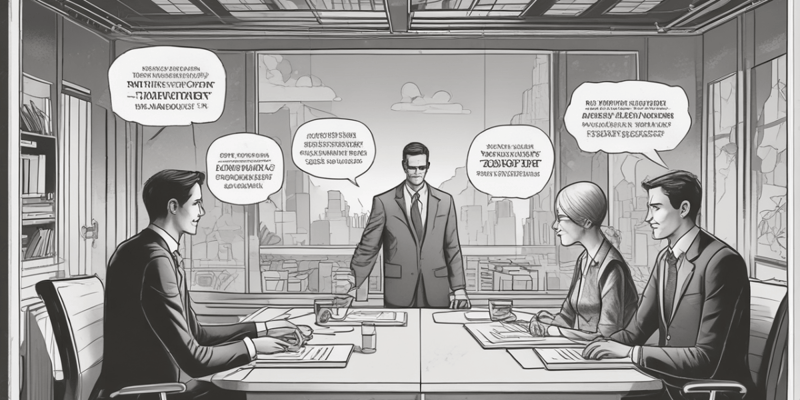20 Questions
What is the primary purpose of resolving disagreements in a group?
To maintain harmony and solve basic problems
What is the key to effective conflict resolution through communication?
Listening actively and expressing thoughts clearly
What is the primary goal of collaboration in conflict resolution?
To find a win-win outcome for all stakeholders
What is the role of a mediator in conflict resolution?
To facilitate dialogue and find a mutually acceptable solution
What is the primary focus of the problem-solving approach?
Addressing the root causes of conflict
What is the benefit of understanding and empathy in conflict resolution?
It reduces conflict escalation
What is a key characteristic of negotiation in conflict resolution?
Finding common ground and identifying common interests
What is the primary goal of compromise in conflict resolution?
To waive some requirements to reach a satisfactory agreement
What is essential for effective communication in conflict resolution?
Being respectful and honest
What is a key benefit of resolving conflicts in a group?
It leads to harmony and solves basic problems
Which conflict resolution strategy involves finding a mediating platform between two parties?
Compromise
What is a key benefit of active listening in conflict resolution?
Resolving misunderstandings
Which conflict resolution approach focuses on finding practical solutions to basic problems?
Problem-solving
What is the primary goal of empathy in conflict resolution?
Reducing conflict escalation
Which conflict resolution strategy involves working together to find a solution?
Collaboration
Conflict resolution always involves direct communication between conflicting parties.
False
Collaboration is a conflict resolution strategy that focuses on finding a win-lose outcome.
False
Negotiation involves a process of competition to reach a mutually acceptable agreement.
False
Effective communication is not necessary for resolving conflicts through compromise.
False
Resolving disagreements in a group always leads to disharmony.
False
Study Notes
Resolving Disagreements
- Effective communication is crucial for conflict resolution, involving active listening, clear expression of thoughts and feelings, and open dialogue.
- Misunderstandings can often be resolved through respectful and honest communication.
Conflict Resolution Strategies
- Compromise: finding a mediating platform by encouraging both parties to make concessions, requiring a willingness to waive some requirements.
- Collaboration: working together to find a solution that meets the needs and interests of all stakeholders, requiring active participation and a focus on finding a win-win outcome.
- Mediation: using a neutral third party to facilitate the resolution process, helping facilitate dialogue, encouraging understanding, and finding an acceptable solution.
- Negotiation: a process of discussion and negotiation to reach a mutually acceptable agreement, involving finding common ground and identifying common interests.
- Problem-solving: focusing on basic problems and working together to find practical solutions, emphasizing collaboration, creativity, and critical thinking.
- Understanding and Empathy: developing an understanding of each other's viewpoints, showing empathy, respect, and acknowledging feelings to reduce conflict escalation.
Choosing a Resolution Method
- The choice of method can vary depending on the nature of the conflict, the individuals or groups involved, and the specific circumstances.
- Sometimes, outside counseling is needed, such as from a mediator or professional counselor, in more complex conflicts.
Resolving Disagreements
- Effective communication is crucial for conflict resolution, involving active listening, clear expression of thoughts and feelings, and open dialogue.
- Misunderstandings can often be resolved through respectful and honest communication.
Conflict Resolution Strategies
- Compromise: finding a mediating platform by encouraging both parties to make concessions, requiring a willingness to waive some requirements.
- Collaboration: working together to find a solution that meets the needs and interests of all stakeholders, requiring active participation and a focus on finding a win-win outcome.
- Mediation: using a neutral third party to facilitate the resolution process, helping facilitate dialogue, encouraging understanding, and finding an acceptable solution.
- Negotiation: a process of discussion and negotiation to reach a mutually acceptable agreement, involving finding common ground and identifying common interests.
- Problem-solving: focusing on basic problems and working together to find practical solutions, emphasizing collaboration, creativity, and critical thinking.
- Understanding and Empathy: developing an understanding of each other's viewpoints, showing empathy, respect, and acknowledging feelings to reduce conflict escalation.
Choosing a Resolution Method
- The choice of method can vary depending on the nature of the conflict, the individuals or groups involved, and the specific circumstances.
- Sometimes, outside counseling is needed, such as from a mediator or professional counselor, in more complex conflicts.
Resolving Disagreements
- Effective communication is crucial for conflict resolution, involving active listening, clear expression of thoughts and feelings, and open dialogue.
- Misunderstandings can often be resolved through respectful and honest communication.
Conflict Resolution Strategies
- Compromise: finding a mediating platform by encouraging both parties to make concessions, requiring a willingness to waive some requirements.
- Collaboration: working together to find a solution that meets the needs and interests of all stakeholders, requiring active participation and a focus on finding a win-win outcome.
- Mediation: using a neutral third party to facilitate the resolution process, helping facilitate dialogue, encouraging understanding, and finding an acceptable solution.
- Negotiation: a process of discussion and negotiation to reach a mutually acceptable agreement, involving finding common ground and identifying common interests.
- Problem-solving: focusing on basic problems and working together to find practical solutions, emphasizing collaboration, creativity, and critical thinking.
- Understanding and Empathy: developing an understanding of each other's viewpoints, showing empathy, respect, and acknowledging feelings to reduce conflict escalation.
Choosing a Resolution Method
- The choice of method can vary depending on the nature of the conflict, the individuals or groups involved, and the specific circumstances.
- Sometimes, outside counseling is needed, such as from a mediator or professional counselor, in more complex conflicts.
Learn effective ways to resolve disagreements between individuals in a group, leading to harmony and problem-solving. Discover the importance of communication and compromise in conflict resolution.
Make Your Own Quizzes and Flashcards
Convert your notes into interactive study material.
Get started for free


